Dear Zazie, Here is today’s Lovers’ Chronicle from Mac Tag. What remains of your day? Rhett
The Lovers’ Chronicle
Dear Muse,
© copyright 2020 mac tag/cowboy coleridge all rights reserved
tired, done with the day,
fixin’ a martini,
thinkin’ of that look
in the lengthenin’ shadows
and the moments with you,
those days long at rest
now left with sorrows
on a changin’ face,
sleep well, there were none but you
and that is all that remains of the day
retreatin’ back into rhythyms and rhymes
hidin’ amidst a crowd of words
amongst what remains of the reveries
© copyright 2019 mac tag/cowboy coleridge all rights reserved
at the Denver airport
flown in and out
of here many times
always solo, of course
chatted with some
lovely women here
never been shy
about that
nothin’ ever came
of those encounters,
those flights
passin’ in the night
my favorite memory here
was watchin’ a woman
in the terminal
runnin’ and jumpin’
into the arms
of her waitin’ love
i slowed to take it in
i did not want to miss
a second of their embrace
it remains, one of my
favorite moments
© Copyright 2018 Mac Tag/cowboy Coleridge all rights reserved
This poem draws it’s inspiration from W. B. Yeats and one of my favorite movies, The Remains of the Day based on the novel of the same name by Kazuo Ishiguro. It stars Anthony Hopkins as Stevens and Emma Thompson as Miss Kenton with Christopher Reeve, and Hugh Grant. The film was nominated for eight Academy Awards.
My books. My words. A Vesper martini. A fire when it is cold. The porch when it is not cold. That is all that is left. That is what ……
Remains of the Day
Now; old and grey and tired, done with the day,
On the porch with this book and a whisky,
Slowly readin’, and dreamin’ of that look
Your eyes had in the lengthenin’ shadows;
How I loved each moment of grace with you,
And your way with beauty and elegance
But those days are past and long, long at rest
Left with the sorrows of my changin’ face,
Bendin’ down beside the glowin’ fire pit,
Whisperin’; ‘Sleep well, there was none but you’
And that is all that remains of the day
Retreatin’ back into rhythyms and rhymes
Hidin’ myself amidst a crowd of words
Amongst what remains of the reveries
© 2013 Cowboy Coleridge All rights reserved
The Song of the Day is from the Soundtrack for The Remains of the Day by Richard Robbins. We do not own the rights to this music. All rights reserved by the rightful owner. No copyright infringement intended.
| William Roberts | |
|---|---|
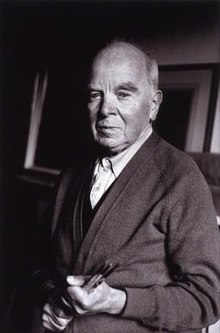
William Roberts, (1970)
|
|
Today is the birthday of William Roberts (Hackney, London 5 June 1895 – 20 January 1980); painter of groups of figures and portraits, and was a war artist in both World War One and World War Two.
Gallery
| Federico García Lorca | |
|---|---|

García Lorca in 1914
|
|
Caballito negro.
¿Dónde llevas tu jinete muerto?
- Little black horse.
Where are you taking your dead rider?- “Canción de Jinete, 1860” from Canciones (1927)
- Verde que te quiero verde.
Verde viento. Verdes ramas.
El barco sobre la mar
y el caballo en la montaña.- Green, how I want you green.
Green wind. Green branches.
The ship out on the sea
and the horse on the mountain.- “Romance Sonámbulo” from Primer Romancero Gitano (1928)
- Green, how I want you green.
- Los caballos negros son.
Las herraduras son negras.
Sobre las capas relucen
manchas de tinta y de cera.
Tienen, por eso no lloran,
de plomo las calaveras.
Con el alma de charol
vienen por la carretera.- Black are the horses.
The horseshoes are black.
On the dark capes glisten
stains of ink and wax.
Their skulls are leaden,
which is why they do not weep.
With their patent leather souls
they come down the street.- “Romance de la Guardia Civil Española” from Primer Romancero Gitano (1928)
- Black are the horses.
- Las heridas quemaban como soles
a las cinco de la tarde,
y el gentío rompía las ventanas
a las cinco de la tarde.
A las cinco de la tarde.
¡Ay qué terribles cinco de la tarde!
¡Eran las cinco en todos los relojes!
¡Eran las cinco en sombra de la tarde!- The wounds were burning like suns
at five in the afternoon,
and the crowd broke the windows
At five in the afternoon.
Ah, that fatal five in the afternoon!
It was five by all the clocks!
It was five in the shade of the afternoon!- Llanto por Ignacio Sanchez Mejias (1935)
- The wounds were burning like suns
- ¡Que no quiero verla!
- Dile a la luna que venga,
que no quiero ver la sangre
de Ignacio sobre la arena. - ¡Que no quiero verla!
- I will not see it!
- Tell the moon to come,
for I do not want to see the blood
of Ignacio on the sand.I will not see it!- Llanto por Ignacio Sanchez Mejias (1935)
- Pero ya duerme sin fin.
Ya los musgos y la hierba
abren con dedos seguros
la flor de su calavera.
Y su sangre ya viene cantando:
cantando por marismas y praderas,
resbalando por cuernos ateridos,
vacilando sin alma por la niebla,
tropezando con miles de pezuñas
como una larga, oscura, triste lengua,
para formar un charco de agonía
junto al Guadalquivir de las estrellas.
¡Oh blanco muro de España!
¡Oh negro toro de pena!
¡Oh sangre dura de Ignacio!
¡Oh ruiseñor de sus venas!- But now he sleeps endlessly.
Now the moss and the grass
open with sure fingers
the flower of his skull.
And now his blood comes out singing;
singing along marshes and meadows,
slides on frozen horns,
faltering souls in the mist
stumbling over a thousand hoofs
like a long, dark, sad tongue,
to form a pool of agony
close to the starry Guadalquivir.
Oh, white wall of Spain!
Oh, black bull of sorrow!
Oh, hard blood of Ignacio!
Oh, nightingale of his veins!- Llanto por Ignacio Sanchez Mejias (1935)
- But now he sleeps endlessly.
- No te conoce el toro ni la higuera,
ni caballos ni hormigas de tu casa.
No te conoce el niño ni la tarde
porque te has muerto para siempre. - No te conoce el lomo de la piedra,
ni el raso negro donde te destrozas.
No te conoce tu recuerdo mudo
porque te has muerto para siempre. - El otoño vendrá con caracolas,
uva de niebla y montes agrupados,
pero nadie querrá mirar tus ojos
porque te has muerto para siempre. - Porque te has muerto para siempre,
como todos los muertos de la Tierra,
como todos los muertos que se olvidan
en un montón de perros apagados. - No te conoce nadie. No. Pero yo te canto.
Yo canto para luego tu perfil y tu gracia.
La madurez insigne de tu conocimiento.
Tu apetencia de muerte y el gusto de su boca.
La tristeza que tuvo tu valiente alegría.- The bull does not know you, nor the fig tree,
nor the horses, nor the ants in your own house.
The child and the afternoon do not know you
because you have died forever. - The shoulder of the stone does not know you
nor the black silk on which you are crumbling.
Your silent memory does not know you
because you have died forever - The autumn will come with conches,
misty grapes and clustered hills,
but no one will look into your eyes
because you have died forever. - Because you have died for ever,
like all the dead of the earth,
like all the dead who are forgotten
in a heap of lifeless dogs. - Nobody knows you. No. But I sing of you.
For posterity I sing of your profile and grace.
Of the signal maturity of your understanding.
Of your appetite for death and the taste of its mouth.
Of the sadness of your once valiant gaiety.- Llanto por Ignacio Sanchez Mejias (1935)
- The bull does not know you, nor the fig tree,
- Verte desnuda es recordar la Tierra.
- To see you naked is to recall the Earth.
- “Casidas,” IV: Casida de la Mujer Tendida from Primeras Canciones (1936)
- To see you naked is to recall the Earth.
- Como no me he preocupado de nacer, no me preocupo de morir.
- As I have not worried to be born, I do not worry to die.
- Quoted in “Diálogos de un caricaturista salvaje,” interview with Luis Bagaría, El Sol, Madrid (1936-06-10)
- As I have not worried to be born, I do not worry to die.
- El remanso del aire
bajo la rama del eco. - El remanso del agua
bajo fronda de luceros. - El remanso de tu boca
bajo espesura de besos.- The still pool of air
under the branch of echo. - The still pool of water
under a frond of stars. - The still pool of your mouth
under a thicket of kisses.- “Remansos: Variación” from El Diván del Tamarit (1940)
- The still pool of air
- Un muerto en España está más vivo como muerto que en ningún sitio del mundo.
- A dead man in Spain is more alive than a dead man anywhere in the world.
- “Theory and Play of the Duende” from A Poet in New York (1940)
- A dead man in Spain is more alive than a dead man anywhere in the world.
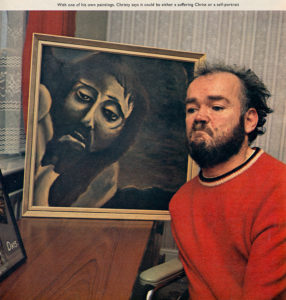 Today is the birthday of Christy Brown (Crumlin, Dublin 5 June 1932 – 7 September 1981 Parbrook, Somerset, England); writer and painter who had cerebral palsy and was able to write or type only with the toes of one foot. His most recognized work is his autobiography, titled My Left Foot (1954). It was later made into a 1989 Academy Award-winning film of the same name, starring Daniel Day-Lewis as Brown.
Today is the birthday of Christy Brown (Crumlin, Dublin 5 June 1932 – 7 September 1981 Parbrook, Somerset, England); writer and painter who had cerebral palsy and was able to write or type only with the toes of one foot. His most recognized work is his autobiography, titled My Left Foot (1954). It was later made into a 1989 Academy Award-winning film of the same name, starring Daniel Day-Lewis as Brown.
When My Left Foot became a literary sensation, one of the many people who wrote letters to Brown was married American woman Beth Moore. Brown and Moore became regular correspondents and, in 1960, Brown holidayed in North America and stayed with Moore at her home in Connecticut. When they met again in 1965 they began an affair. Brown journeyed to Connecticut once more to finish a book, which he had been developing for years. He finally did so in 1967 with help from Moore, who introduced and administered a strict working regimen, mostly by denying him alcohol (on which Brown was dependent) until a day’s work was completed. The book, titled Down All the Days, was published in 1970 and was inscribed with a dedication to Moore that read, “For Beth, who with such gentle ferocity, finally whipped me into finishing this book…” Upon his return to Ireland, he was able to use proceeds from the sales of his books to design and move into a specially constructed home outside Dublin with his sister’s family. Though Brown and Beth had planned to marry and live together at the new home, and though Moore had informed her husband of these plans, it was around this time that Brown began an affair with Englishwoman Mary Carr, whom he met at a party in London. Brown then terminated his affair with Moore and married Carr at the Registry Office, Dublin, in 1972. They moved to Stoney Lane, Rathcoole, County Dublin (now site of Lisheen Nursing Home), to Ballyheigue, County Kerry and then to Somerset. He continued to paint, write novels, poetry and plays. His 1974 novel, A Shadow on Summer, was based on his relationship with Moore, whom he still considered a friend.
Brown’s health deteriorated after marrying Carr. He became mainly a recluse in his last years, which is thought to be a direct result of Carr’s influence and perhaps abusive nature. Brown died at the age of 49 after choking during a lamb chop dinner. His body was found to have significant bruising, which led many to believe that Carr had physically abused him. Further suspicions arose after Georgina Hambleton’s biography, The Life That Inspired My Left Foot, revealed a supposedly more accurate and unhealthy version of their relationship. The book portrays Carr as an abusive alcoholic and habitually unfaithful. In Hambleton’s book, she quotes Brown’s brother, Sean, as saying: “Christy loved her but it wasn’t reciprocated because she wasn’t that kind of person. If she loved him like she said she did, she wouldn’t have had affairs with both men and women. I feel she took advantage of him in more ways than one.”
Gallery
Mac Tag
Follow us on twitter @cowboycoleridge

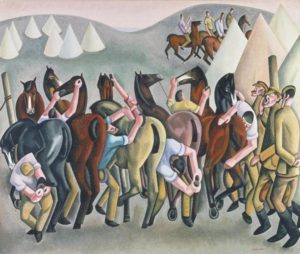
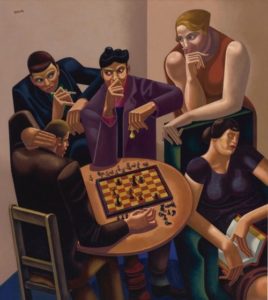
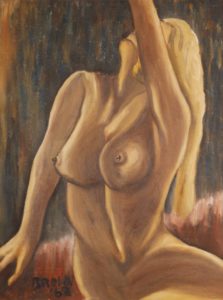
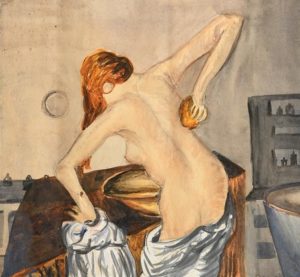
No Comments on "The Lovers’ Chronicle 5 June – remains – art by William Roberts & Christy Brown – verse by Federico García Lorca"